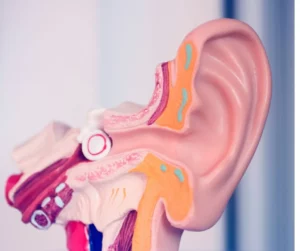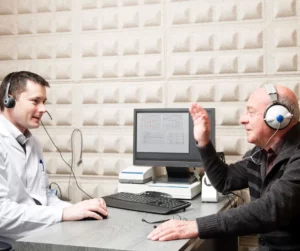Graceful Aging: Managing Hearing Health as We Grow Older

This article focuses on the crucial yet often overlooked aspect of hearing health, particularly as it relates to presbycusis hearing loss, also known as age-related hearing loss. As we age, maintaining good hearing health becomes essential not just for communication but for overall well-being and quality of life. Stay with us as we explore how to proactively manage presbycusis and make informed decisions that will enrich your later years.
What Is Presbycusis, Or Age-Related Hearing Loss?
Age-related hearing loss slowly reduces hearing capabilities and frequently affects seniors. One in three adults over 65 experiences age related deafness. Many don’t realize their hearing is declining because changes occur gradually. Notable symptoms include trouble hearing high-pitched sounds like phone rings or microwave beeps, while low-pitched noises are usually still audible.

Key Locations Affecting Age-Related Hearing Loss:
- Inner Ear: The cochlea, located in the inner ear, contains hair cells that turn sound vibrations into electrical signals. Age-related hair cell loss impacts the ability to process especially high-pitched sounds.
- Middle Ear: This area houses the eardrum and three small bones, known as ossicles, that amplify sound. Aging may harden these bones, reducing their sound-transmitting efficiency.
- Auditory Nerve Pathways: These nerves carry sound signals from the inner ear to the brain. Age can weaken these pathways, affecting the brain’s sound interpretation.
Contributing Factors to Age-Related Hearing Loss:
Causes can be grouped into genetic, environmental, and lifestyle factors. Genetic factors involve inherited tendencies and the natural aging of the auditory system. Environmental and lifestyle factors include exposure to loud noises and health conditions like heart disease and diabetes. Additional contributors include medication side effects, like those from aspirin and certain antibiotics.
Learn more about types of hearing loss.

What Are The Symptoms of Age-Related Hearing Loss?
Common symptoms to watch for include difficulty hearing high-pitched sounds, problems understanding speech in noisy places, and frequently asking for repetition in conversations. Additional indicators might be increasing the TV or radio volume, missing phone rings, hearing muffled sounds, and experiencing tinnitus. If these symptoms appear, consult a hearing specialist for early intervention.
Additional Warning Signs of Age Related Deafness
Beyond basic symptoms, further signs can indicate advancing hearing loss. These include difficulties following conversations in quiet spaces, avoiding social interaction, experiencing mood changes like anxiety or depression, and having accidents due to inaudible warning sounds. For these issues, a comprehensive audiologist assessment becomes crucial.
Communication Strategies
Navigating age-related hearing loss involves both medical treatment and communication adaptation. Tips for better communication include asking people to face you when speaking, focusing on both verbal cues and facial expressions, and selecting conversation venues with minimal noise.
Treatment Options for Age-Associated Hearing Loss
Medical treatments for this condition range from medications to surgeries. However, hearing aids remain the most commonly prescribed option. After a thorough exam, healthcare professionals can fit you with suitable hearing aids.
Explore more about types of hearing aids.
Assistive Devices and Adaptation
In addition to hearing aids, other devices can help manage your condition. These gadgets amplify sound, offer visual alerts, and facilitate communication through text-to-speech technology. These aids can significantly improve your quality of life.
Preventive Measures
While you can’t entirely prevent age-related hearing loss, certain proactive steps can minimize its risk. Focus on managing conditions like heart disease and diabetes, limit exposure to loud noises, and use ear protection in noisy settings. Also, choose headsets over earbuds and be cautious with medications that may affect hearing. Adopting these strategies helps mitigate the risk of noise-induced hearing loss and lays a foundation for better auditory health as you age.
Proactive Steps to Minimize Age-Related Hearing Loss
While you can’t entirely prevent age-related hearing loss or presbycusis, specific proactive steps can reduce your risk. Focus on lifestyle adjustments and early intervention methods:
- Maintain good overall health to manage conditions like diabetes and heart disease that can affect hearing.
- Limit loud noise exposure by using earplugs or earmuffs in high-volume settings.
- Wear personal protective equipment if your job exposes you to loud noises.
- Choose specialized earplugs at noisy events like concerts or sports games.
- Opt for headsets over earbuds and keep the volume moderate.
- Be cautious of medication side effects and avoid ototoxic drugs when possible.
These strategies guard against noise-induced hearing issues and set a foundation for healthier aging.
Read here for more on hearing protection.

Managing Age-Related Hearing Loss with Stanford Hearing Aids
In summary, aging well involves more than physical looks—it demands proactive healthcare, particularly in overlooked areas like auditory health. Recognizing the symptoms of presbycusis and seeking early diagnosis can significantly enhance your communication skills, emotional state, and overall quality of life. Your options range from medical treatments and advanced hearing aids to lifestyle changes that reduce risk. Awareness marks the first step in this journey. Don’t neglect age-related hearing loss; it merits your focus and care.
Stanford Hearing Aids offers free consultations to assess your hearing needs and provide expert advice. Schedule your consultation today for a proactive approach to aging.
